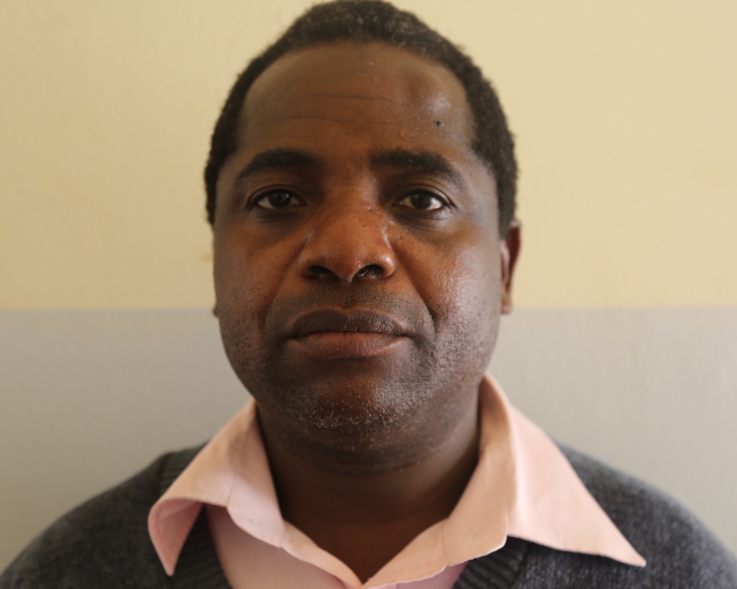
Dr Anias Mutekwa
Position: Senior Lecturer
Department:
English and Communication
Share Profile
Search on Google Scholar
ORCID ID: 0000-0001-5250-0830
Qualifications
- PhD in English (North-West University-2020, South Africa)
- MA in English (University of Zimbabwe-2002, Zimbabwe),
- BA Honours in English (University of Zimbabwe- 1999, Zimbabwe),
- Post-Graduate Diploma in Tertiary Education (Midlands State University-2014, Zimbabwe),
- Certificate in Education: Secondary (University of Zimbabwe-1991, Zimbabwe).
Research Interests
- Literature, gender and identity.
- Coloniality and decoloniality in literature.
- Zimbabwean and African Literature.
- Ecocriticism
Current Research
- Gender and Identity in Zimbabwean and African literature.
- Coloniality and decoloniality in literature.
- Ecocriticism.
Publications:
(a) Journal Articles
- Mutekwa, A. (2009). ‘Gendered Beings, Gendered Discourses: the Gendering of Race, Colonialism, and Anti-Colonial Nationalism in three Zimbabwean Novels.’ Social Identities 15 (5): pp.725-740.
- Mutekwa, A. (2009). ‘ Of “Saints” and “Devils”: Mapping a Quasi-Anarchist Organisation in Mario Vargas Llosa’s The War of the End of the World, and an Anarchist one in Dambudzo Marechera’s Black Sunlight.’ UNISA Latin American Report 1 (2); pp.168-181.
- Mutekwa, A. (2010). ‘The Avenging Spirit: Mapping an Ambivalent Spirituality in Zimbabwean Literature in English.’ African Studies 69(1): pp. 161-176.
- Musanga, T. & Mutekwa, A. (2011). ‘Destabilizing and Subverting Patriarchal and Eurocentric Notions of Time: An Analysis of Chenjerai Hove’s Bones and Ancestors.’ Journal of Black Studies 42(8): pp.1299-1319
- Mutekwa, A. (2012). ‘The Recovery of Narratives and Subjectivities of Brutalised and Traumatized Women in Neshani Andreas’s The Purple Violet of Oshaantu and Chimamanda N. Adichie’s Purple Hibiscus.’ Imbizo 3(1): pp. 54-68.
- Mutekwa A. (2012). ‘Gendered Globalisation Discourses: Implications for the African Renaissance’. International Journal of African Renaissance Studies 7(1): pp.5-21.
- Mutekwa, A. & Musanga, T. (2013). ‘Subalternizing and Reclaiming Ecocentric environmental Discourses in Zimbabwean Literature: (Re)reading Doris Lessing’s The Grass is Singing and Chenjerai Hove’s Ancestors.’ Interdisciplinary Studies in Literature and Environment 20(2): pp. 239-257.
- Ngoshi, H.T. & Mutekwa A. (2013). ‘The Female Body and Voice in Audiovisual Propaganda Jingles: the Mbare Chimurenga Choir Women in Zimbabwe’s Contested Political Terrain.’ Critical Arts 27(2): pp 235-248.
- Musanga, T. & Mutekwa, A. (2013). ‘Supra-masculinities and Supra-femininities in Solomon Mutsvairo’s Chaminuka: Prophet of Zimbabwe (1983) and Yvonne Vera’s Nehanda (1993).’ African Identities 11(1): pp. 79-92.
- Mutekwa, A. (2013). ‘From “Boys” to “Men”? African and Black Masculinities, Triangular Desire, Race, and subalternity in Charles Mungoshi’s Short Stories.’ Social Dynamics 39(2): pp. 353-367.
- Mutekwa, A. (2013). ‘“In This Wound of Life …”’: Dystopias and Dystopian Tropes in Chenjerai Hove’s Red Hills of Home.’ Journal of Literary Studies 29(4): pp. 98-115.
- Mutekwa, A. (2013). ‘The Challenges of Using the Communicative Approach in the Teaching of English as a Second Language (ESL) in Zimbabwe: Implications for ESL Teacher Education.’ Africa Education Review 10(3), pp.542-556.
- Mutekwa A. (2017). ‘Through a Charged Field:Authoritative Discourses and Dialogism in Solomon Mutsvairo’s Chaminuka: Prophet of Zimbabwe (1983).’ Research in African Literatures 58(4), pp. 193-208.
- Mutekwa A. (2019). ‘The Journey Motif, Childhood, Race and Nation in Sandra Braude’s Mpho’ s Search (1994).’ African Identities 17(1), pp. 51-63
- Mutekwa A. (2022). ‘An Analysis of Intertextual Entanglements in Shimmer Chinodya’s Chairman of Fools’. Scrutiny 2: Issues in English Studies in Southern Africa 27(1), pp. 33-47
- Mutekwa A. (2022). ‘ Mapping Post colonial Marginalisation and Reactive/Adaptive Models of Masculinity: Tropes of Hegemonic Masculinities, Masculine (Over)Compensation and Hybridity in Noviolet Bulawayo’s We Need New Names’. Matatu: Journal for African Culture and Society 53(1-2), pp.184-208.
- Mutekwa A. (2023). ‘Masculinities and the “Colonial Unconscious” in Shimmer Chinodya’s Dew in the Morning’. Journal of the African Literature Association 17(3), pp.373-388.
(b) Book Chapters
- Mutekwa A. (2013). ‘Blowing People’s Minds’: Anarchist Thought in Dambudzo Marechera’s Mindblast. In Reading Marechera, Ed. Grant Hamilton. London: James Curray, pp. 25-37.
Suggest a correction
If you'd like to suggest a correction for this profile and you are the owner use the edit button button below. For corrections to another person's profile contact the Webmaster on the email webmaster@staff.msu.ac.zw or call ext 3132
Edit Profile